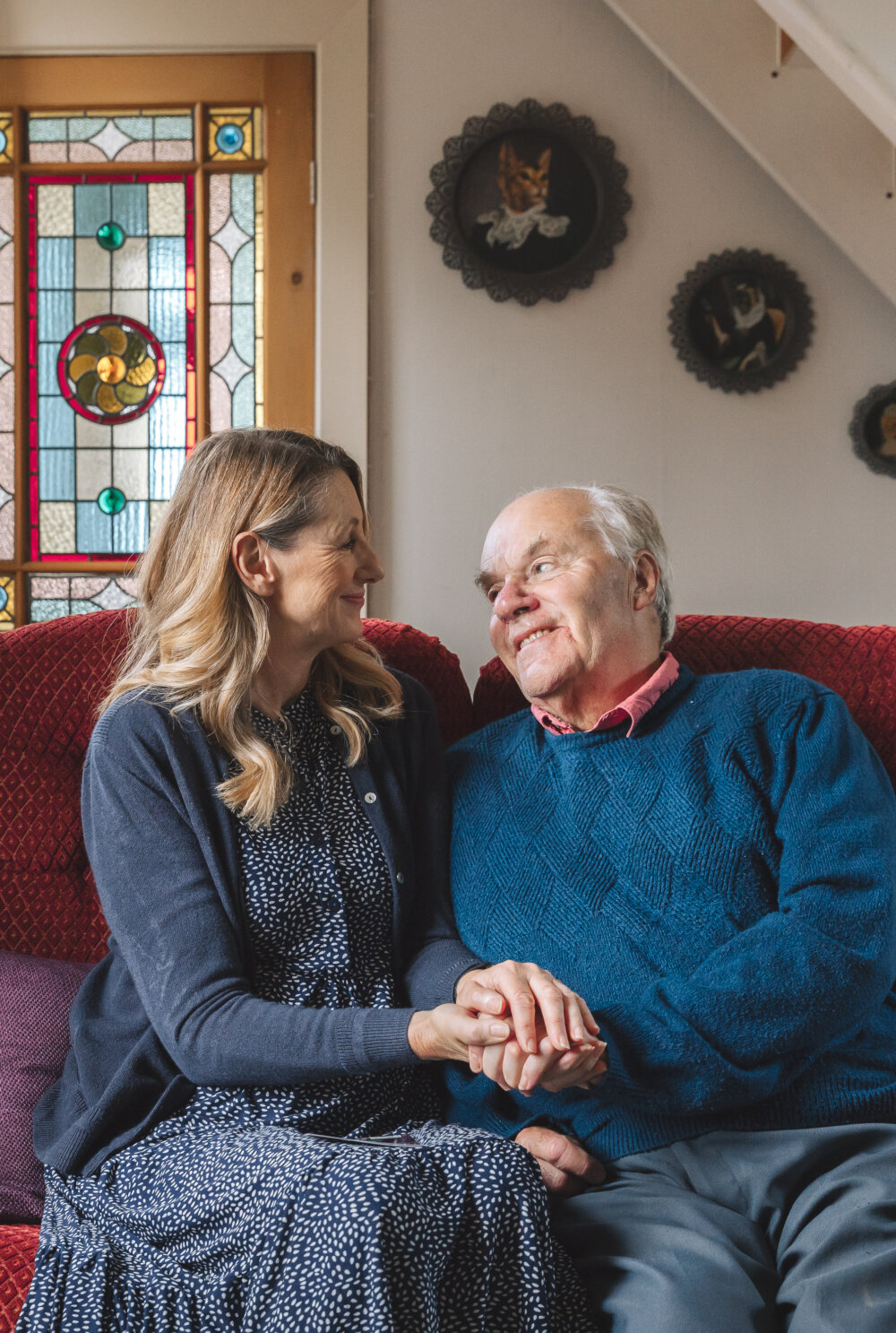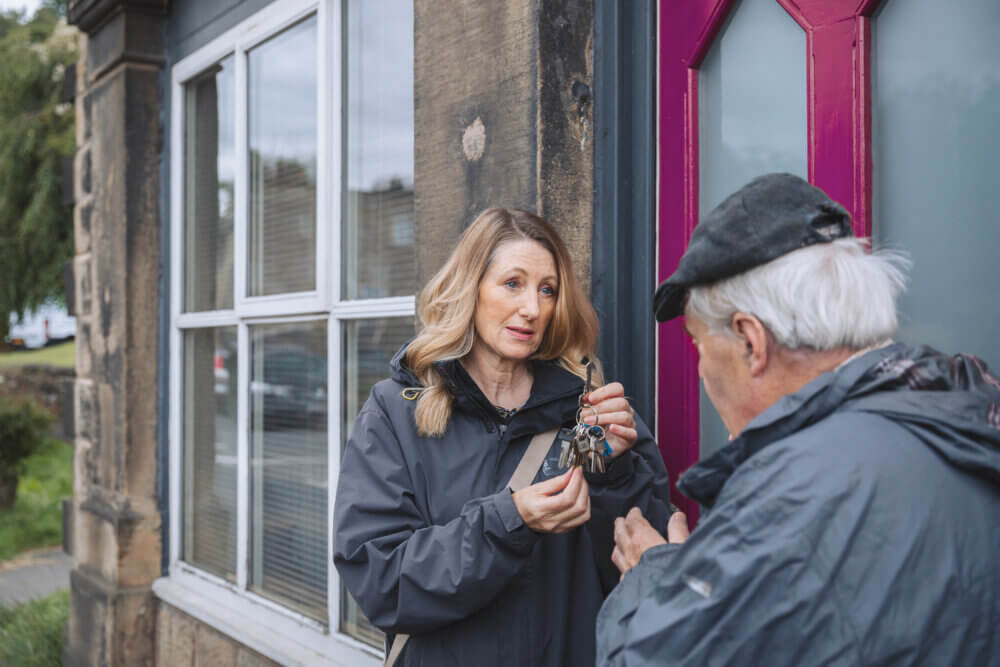How To Care For Ageing Parents
Learn more about taking care of your parents as they get older, and what help is available to support you.

It is a difficult transition when a parent begins to require more help in life. The role reversal of looking after someone who used to look after you can be emotionally challenging, as well as creating certain logistical issues if you are managing caring duties by yourself alongside work, raising children, and other life responsibilities. Here, we are sharing everything you need to know about how to care for your parents as they get older, where to find the advice and support you need, when medical intervention might be needed, the challenges you could face during the process, the pros and cons of DIY home care, and when it might be time to seek external support. At Home Instead, our aim is to help people age positively and in place by bringing expert care to their home. For nearly 20 years, we have been providing the highest standard of care, and creating industry-leading training programmes for our Care Professionals that are accredited by nursing and medical professionals. Today, we are the world’s largest global home care network, supporting over 100,000 older adults with personalised, tailored care at home. So whatever questions you have about caring for ageing parents, we can help.
How to know when a parent’s needs change
We tend to see our parents through the lens of childhood no matter what age we are. They have always looked after us, which is why it can be difficult to both accept that a parent needs additional help, and to recognise when this is the case. Ageing is a gradual process, so it is tricky to detect when your parent has crossed the threshold from managing well on their own to needing some assistance. Ultimately, you want to avoid waiting until your parent has a fall or accident before putting steps in place to keep them safe, so understanding when their needs have changed and how you can help them is important. Every older person is completely different, and the care they require should always be tailored to suit their needs and preferences, rather than being a one-size-fits-all solution. Figuring out what sort of care needs your parent has often requires:
- Talking to your mum or dad in depth about any care plans they already have in place, and what they would like to happen
- Communication with other family members and friends who spend time with your parent, so everyone has a chance to share their thoughts
- Keeping a watchful eye on them and their home to see if they might be struggling with anything in particular
- Talking to any specialists involved with your parent’s health, such as their GP or any social workers, to see what they recommend
You may find our guide on this topic helpful for more information: How To Tell If You Or A Loved One Needs Support.

How to start caring for an ageing parent
If you have identified the areas where your parent may need additional help, it is important to take action as soon as possible to avoid procrastinating on any changes that must be made. There is no point in identifying that your mum or dad may need help cooking dinner, and then discovering several days later they have been skipping meals as a result. On the more dangerous end of the scale, they could have a serious fall which could have been prevented with immediate action, so it is vital to make a plan and implement changes. Here are some of the initial steps you can take when starting to plan care for an older parent:
Talk to them
Before anything else, you should speak to your parent about their advancing care requirements so you have a clearer understanding of their needs. Remember they may be hesitant to bring up seemingly embarrassing personal care needs, or may not realise they could benefit from help until you broach the subject. Speak in depth and allow them to voice any concerns they have, to help you understand their preferences and the way they like things done. Remember, they are the ones receiving care, so they should be included in any discussions and made to feel they have control over the situation.
Consider your capacity
It is one thing to decide your parent needs additional help, but another to figure out how and when that help needs to be given. If you plan to care for your parents yourself, be realistic about how this can work around your own life, as it may take up more time than you think. Consider how much time you have in your week, and if you have the skills, patience and physical health yourself to carry out what is required.
Think about the practical things
As well as considering what your parent needs, it’s a good idea to consider other practical solutions that could make things easier. This could be deciding to move into your parent’s home, or move your parent into your home to simplify day-to-day caring duties. Or it could be figuring out how to get power of attorney for an older parentso you can help with things like finances and home administration if they want you to. Sit down with them and make a list of all the ways you can optimise the caring process.
Create a routine
Juggling your own life and caring duties can quickly become chaotic and unmanageable, so implementing a routine early can help you manage your life and your parent’s expectations, while ensuring your parent’s preferences are taken into account so they continue to engage in their usual social activities. You may want to set routines around things like mealtimes, household chores, medication schedules, and more. When doing this, involve your parent in this routine too so they don’t feel their days are being planned out for them.
Make the home safer
Whether or not home management is becoming an issue for your mum or dad, it is beneficial to look at their home through the lens of a carer rather than a family member to see if any adaptations need to be made to make it safe and accessible. This might mean installing stair lifts, grab rails or emergency alarms, or it could simply mean removing a rug that might become a trip hazard.
Consult their doctor
Your parent’s doctor will know more information about their health situation that could help when planning their care needs, so setting up an appointment with them to discuss this is a great first step. When doing this, their doctor can recommend any additional services that may be useful to help with their medical conditions, and help you understand and manage any medication schedules that must be adhered to.

Logistical challenges of caring for ageing parents
Becoming a caregiver – even if only on a part-time basis – can be a challenge when juggling work, life, children, and other responsibilities. Some of the logistical challenges you may face include:
Time restraints
Taking on the care needs of your parent only works if you have the time. If you are managing this alongside a job, partner, children and more, you may feel there are restrictions on how much you can actually do for your parent by yourself. When you feel stretched too thin, it is usually time to discuss sharing the care load with others, whether that means with a sibling, a friend, or employing a professional carer.
Advancing care needs
Your parent’s care needs will continue to change as they age, and any medical conditions they have could cause varying symptoms and issues at different times. If their care needs are changing on a monthly, weekly or daily basis it can be difficult to manage this alone, and professional care may be required from a registered nurse or doctor.
Financial considerations
Caring for an older parent could mean adjusting hours at your job so you have time each week to care for them. It’s always worth researching financial aid you may be eligible for as a caregiver, because if you spend 35 hours a week or more caring for your parent you may qualify for Carer’s Allowance which is up to £76.75 per week. If you need further advice on this, our guide on financial benefits for pensioners could help.You may also be eligible for help with paying for care, and you can read our guide on paying for care to learn more about this, too.

Emotional challenges of caring for ageing parents
It can be incredibly difficult to see your mum or dad become less recognisable over time, and this can cause many emotional challenges. These include:
Seeing a parent become more frail
When your parent has always been physically able, it is difficult to watch their mobility and health decline, and can be upsetting no matter what age you are. As well as the physical decline, it can be tough to witness them start to struggle with conditions like dementia or Alzheimer’s, or perhaps stop feeling like themselves. The ageing process can adapt their personality, so it is important to be prepared for this if you plan to care for a parent yourself.
Trying to manage everything
Caring responsibilities can have a huge impact on your own wellbeing, as you are constantly focused on the health and needs of someone else. Recognise when you may be near burnout stage, and take proactive steps to look after your health. It is easy to feel guilty when spending time on your hobbies or with your family while an older loved one is at home, but you must continue to live your life. Remember to prioritise your health and wellbeing in order to show up as the best version of yourself and provide the best care to your parent. Request compassionate leave from work if you need to, and delegate tasks to other family members.
Facing the changing relationship with your parent(s)
When you start caring for a parent, your relationship with them naturally begins to change. If you once talked to them about your worries and fears, you may not feel you can do this now. Whether you experience resentment for the situation you find yourself in, or fear about your parent one day not being around, these are valid feelings that – even if you can’t speak to your mum or dad about them – you should share with someone you trust, like another family member or a friend. Talking about your feelings can help you process them.

How to know whether your parent can stay at home or not
One of the biggest decisions when it comes to the care needs of an older parent is whether or not they should be moved to an assisted living facility, care or nursing home, or if they can receive the care they need in their own home. When you begin looking into care options, explore the pros and cons of all options, and chat with your parent to see what their preference is. If their needs are advancing, a Care Needs Assessment is probably required, which means an assessor from the local council will visit your parent’s home and check whether or not they feel any of the above options are needed. The council’s main objective will be to keep your parent in their own home as long as possible, so they may suggest home care options or adaptations to the home to make it safe and accessible. You can learn more about this process and how to arrange it in our guide to the Care Needs Assessment.If your parent doesn’t have any major medical needs or mobility issues, you may be considering caring for them yourself in their home, or bringing in the help of a home care agency like Home Instead to help with things like personal care, home help and housekeeping, or for companionship.You can read more about home care and its benefits in our other guides: What Is Home Or Domiciliary Care? and The Benefits Of Home Care vs A Care HomeThere are also adult day care centres which offer respite options for older people or disabled people. They can attend for the day to socialise with others in their area, so these options are great if you plan to care for your parent yourself but need regular breaks. You might also want to learn more about the role of live-in respite care.Remember, when discussions are being had about where your parent will live, it is important to involve them in these conversations. While the logistics may be a worry for you, they will likely be feeling anxiety about what their future looks like, and you can put their mind at ease by giving them a sense of control and autonomy over their own life.

The pros and cons of “DIY” home care
There are several ways to receive professional home care – such as funded through your local council or paid for through an agency – but if you are thinking about taking on caring duties yourself, or continuing to do so if you have already started, you may be weighing up the pros and cons of this. Here are a few to consider:
Pros of handling home care yourself
- DIY care offers the chance for you to spend more time with your parent
- Your parent may feel more settled physically and emotionally by having a familiar face around and staying in the home they know and love
- Your parent may feel more comfortable telling you about their needs than a stranger
- You may feel more content doing things yourself than trusting someone else to look after your parent in the same way you would
- Care can be personalised to the needs, preferences, likes and dislikes of your parent, since you probably know them best
- DIY care could be more cost-effective as you do not need to enlist full-time home care services
Cons of handling home care yourself
- Providing care at home can be physically demanding, and often means managing your parent’s home as well as your own. This could mean double the housework and double the errands to run, as well as physical tasks like personal care and helping your parent move around safely at home
- Caregiving can be emotionally tough as you may be seeing your parent’s health decline, and they could start to seem less like themselves over time
- Round-the-clock care can start to affect your own health and life responsibilities, and it can be difficult to balance work and other things with your caregiving duties
- If you do not have a medical or care background, or any professional training, this could impact your parent’s health as you may not be able to recognise certain needs, and unknowingly provide inadequate care
- You may lack certain resources that would increase the quality of your parent’s care, that a trained carer would have access to
How to fund care
If you are leaning towards a combination of DIY care and home care services through your local council or an agency, the next question many people have is how they will fund such services. The Care Needs Assessment will evaluate whether your parent is eligible for funding through their local council, and can help you arrange this.
Depending on your parent’s needs, you may be looking at occasional home care visits from a professional carer, or perhaps you are looking to enlist their services for part-time home care while you work, and take on the remaining hours yourself. There are many combinations available, and home care is flexible to allow you to be as involved as you like.
You will find lots of information on how much home care might cost for your specific situation, and how to arrange funding for your parent’s home care in our guides to the cost of home care and how to pay for care.

Other types of support for carers
Becoming a carer for a parent can come with feelings of helplessness and confusion. Often it isn’t something that has been thought about in advance, so taking a back seat on other parts of your life in order to provide care can feel emotionally challenging.
Keep in mind there are several charities and organisations available to help, as well as support groups for both you (the caregiver) and your parent (the care receiver) to make the process feel less isolating and overwhelming.
While researching your care options, the below charities may provide additional resources, advice and support:
NHS Social Care and Support Guide
Also, consider other ways to make caring for your parent easier by freeing up your schedule of tasks that do not require specialist care. You could outsource things like housekeeping and meal preparation, or even hot meal delivery.
You should not be solely responsible for taking care of an ageing parent, so try to engage the help of other family members if you can, including siblings, aunts and uncles, or family friends. Share the responsibilities with others in order to lighten the burden on yourself, and make caring more manageable. Even if other family members live far away and are unable to provide regular in-person caring, they could help with the planning and organisation side of things, and talk with you to offer emotional support.
If your parent’s needs are more advanced, you may find our guide on becoming a full time carer for a family member helpful.

Home care services can be an excellent, flexible solution enabling you to create a bespoke care package for your parent, either to completely manage their needs or to keep on top of the days when you are unable to provide care. From simple companionship where our Care Professionals will spend quality time with your parent to ensure they are never lonely, to specialist health care to keep on top of your parent’s health needs, we can tailor care to fit with your exact requirements while keeping your parent in the comfort of their own home for as long as they would like to remain there.
Our Care Professionals are highly trained to deliver the individualised service you are looking for, so get in touch to discuss what you’re looking for. We’re an award-winning home care provider and part of a worldwide organisation devoted to providing the highest quality relationship-led care for older people in their own homes. Arranging care for yourself or your loved one shouldn’t be stressful, so whatever questions you would like answered, feel free to reach out to the Home Instead team to discuss your needs.

Diane WIlliams , Head of Quality & Standards
Before joining Home Instead, I built a comprehensive career in the social care sector, beginning in 1991 as a frontline care worker and advancing to senior leadership roles across both private and voluntary sector businesses.
Throughout my career, I have supported diverse care groups in a variety of settings, including community, residential, nursing, and secure environments. My experience spans working with older adults, including those living with dementia; individuals with physical disabilities and complex, long-term health needs; people with learning disabilities, including autism; individuals with enduring mental health challenges; individuals with current or past substance use and those with forensic backgrounds.
In 2002, I qualified as a social worker and have since maintained my professional registration with Social Work England.